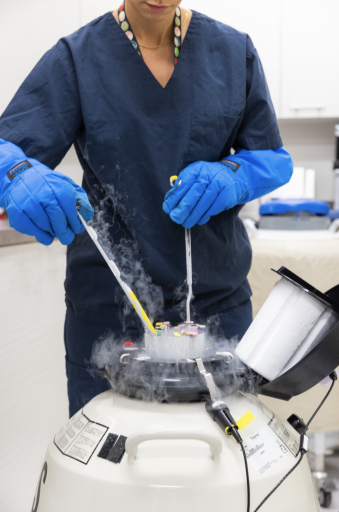A diagnosis of infertility can greatly undermine your confidence, but must not in any case be perceived as a weakness. It’s a medical condition. Fertility must not be confused with virility. A physiological or hormonal imbalance can influence the number, shape, motility or ADN of sperm cells.
Here are some causes for male infertility:
- Hormonal imbalance. A low sperm count can sometimes be explained by abnormal FSH and LH levels leading to a decrease in testosterone.
- Chemotherapy and radiation therapy can cause genetic mutations in the cells responsible for sperm renewal.
- Varicocele is a disorder that affects 22% of the general population and 40% of infertile men. A weakness in the walls of the veins in the spermatic cord reduces blood circulation to the testicles, which causes an increase in temperature and impedes sperm maturation.
- Cryptorchidism is a congenital abnormality that is increasingly common. It is defined by the failure of one or both of the testicles to descend into the scrotum. The temperature inside the testicles is too high, which prevents sperm cells from fully maturing.
- Antisperm antibodies. The testicles are shielded from the body’s blood circulation by a protective barrier. If this barrier becomes damaged following surgery or by disease, it stimulates the production of antisperm antibodies. These antibodies attack the sperm cells and impede their movement. Possible causes for the presence of antibodies:
- Testicular trauma (surgery, injury, torsion)
- Cryptorchidism
- Infection (STI, epididymitis)
- Testicular cancer
- Congenital absence of vas deferens (cystic fibrosis)
- Varicocele
- Vasectomy and vasovasostomy (vasectomy reversal)
- A vasectomy is a male sterilization method. This minor surgical procedure consists in cutting the vas deferens. The sperm cells can no longer leave the testicles and mix with the semen. A vasectomy can sometimes be reversed.
Types of infertility:
- Azoospermia, when there is no sperm in the ejaculate
- Oligozoospermia, when sperm concentration is low
- Asthenozoospermia, when sperm motility is reduced
- Teratozoospermia, when the number of sperm cells with abnormal morphology is higher
